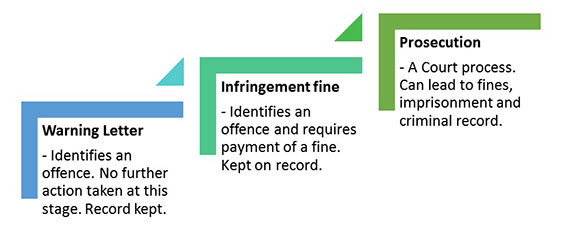DOC enforces laws that protect New Zealand’s biodiversity and historic heritage, as well as the Taupō Trout Fishery. We have a range of enforcement options available when people break the rules that help protect those conservation resources.
DOC can issue a warning letter or an infringement notice (fine). Fines range from $200 to $800, with the amounts set by law. Those committing serious or repeat offences can face criminal prosecution.
What are DOC’s enforcement tools?
Our enforcement tools range in strength, or impact on alleged offenders, from a warning through to prosecution.
Warning letter
A warning letter identifies an offence but gives no penalty. It can be used for low-level offending. The letter is recorded and can be considered in future. (For example, if future non-compliance occurs, the enforcement response may be stronger.)
Infringement fine
An infringement notice alleges that an offence has been committed. It requires payment of a fine. Infringement offences and fine amounts are set by law. DOC can issue fines ranging from $200-$800. Infringement notices can deal with many breaches of the rules that are not serious enough for prosecution. Infringement offences can’t result in a criminal record. DOC keeps a record of fines issued and they are considered if there is future non-compliance.
Fines must be paid within 28 days. Fines still unpaid after 28 days and one reminder notice are referred to the Ministry of Justice for debt collection.
More information on paying fines, including disputes
Prosecution
This is a process that’s taken through the Court. The Court can impose sanctions if the alleged offender is found guilty such as fines or imprisonment. The objective is to hold people to account who break the law in a serious or repeated manner, and to deter the offender or others from future non-compliance.
The image below summarises these three tools:

How does DOC make enforcement decisions?
First, there must be sufficient evidence of offending. Second, if that is established, our general approach is to look at the seriousness of the offending in each case to guide which enforcement tool is used. The same offence (eg, whitebaiting with illegal gear) can vary in seriousness, depending on the circumstances or facts.
Overall, we consider the circumstances of each offence and offender in order to ensure a reasonable decision. Circumstances we can consider include:
- harm to conservation resources, including the risk of harm
- conservation values of the affected resources and environment
- previous offending by the person or people involved
- intent, including any commercial motivation involved
- impact on or harm to iwi cultural values.
We may also consider DOC’s conservation priorities and how best to achieve positive conservation outcomes. We give effect to Treaty principles (section 4, Conservation Act).
Any decisions to prosecute are made under DOC’s Prosecution Policy. This policy accords with the Solicitor-General’s Prosecution Guidelines.
Who in DOC makes enforcement decisions?
We have the right people for the right job. Decision-making responsibilities are allocated to specific positions in DOC with the necessary expertise and seniority. This ensures decisions are robust, impartial and transparent. It also recognises seriousness of the offending and the consequences of enforcement on alleged offenders (for example, could they receive a criminal record).
Warranted Officers make decisions to issue warning letters and infringement fines. These staff are specially trained and warranted to undertake enforcement work under the Conservation Act 1987. Members of senior staff, with legal advice, make decisions to prosecute. DOC’s legal team lead the prosecution process.
For more information, read our Enforcement and Prosecution policies.